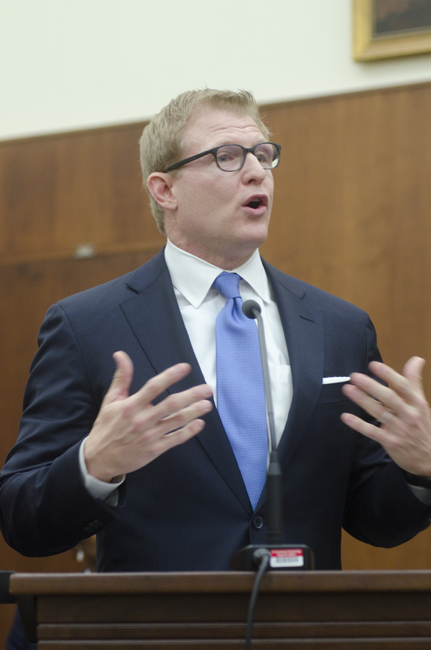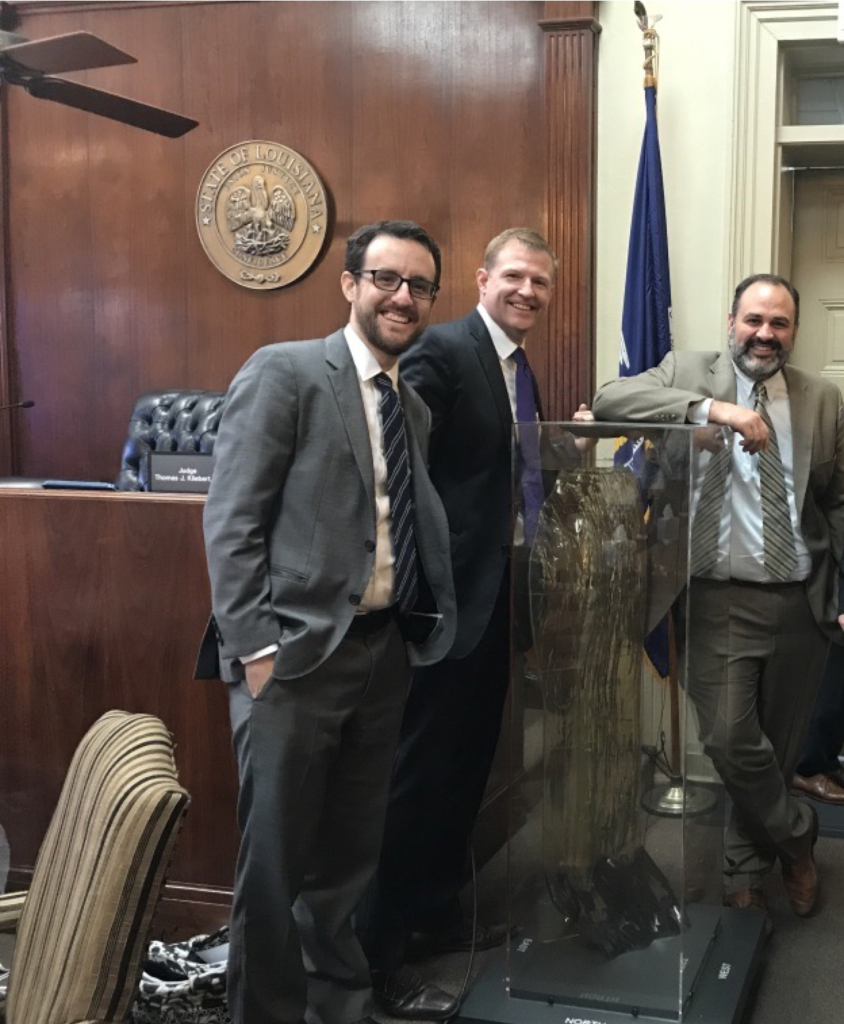Litigation boutiques have been luring young hotshot lawyers away from large, full-service law firms for more than two decades in Texas.
The rich corporate law firms, however, are showing signs of fighting back. And they are demonstrating that they have the deep pockets to do it.
This week, Gibson, Dunn & Crutcher is expected to announce that Trey Cox, a name partner at Lynn Pinker Cox & Hurst, is joining the firm as a partner in its trial section.

Cox, who is married to Northern District of Texas U.S. Attorney Erin Nealy Cox, was a lead lawyer representing Purdue Pharma in litigation over the opioid epidemic and had been with the Lynn Pinker law firm for 23 years.
“I am moving one side of my home desk to the other side of my home desk,” Cox, joking about starting the new job under the COVID-19 stay-at-home orders, said in an exclusive interview with The Texas Lawbook.
Rob Walters, managing partner of Gibson Dunn’s Dallas office and the lead trial lawyer who represented AT&T in its successful antitrust trial against the Trump administration involving the $86 billion Time Warner merger, said he’s admired Cox for years.
“Trey is one of the best commercial trial lawyers of his generation,” Walters told The Texas Lawbook. “His breadth and skillset are perfect for our broad platform. Joining Gibson Dunn allows Trey to take his trial practice to a whole new level.”
Cox said he only started considering making a move earlier this year.
“Rob took me to breakfast in January and that was the first time I thought about making a change,” he said. “I took an exhaustive list of top AmLaw platform firms and Gibson Dunn was at the top.”
Cox joins a Gibson Dunn litigation team that includes Bill Dawson, Allyson Ho, Veronica Lewis, Mike Raiff and Brian Robison in Dallas and appellate law giants Ted Olson and Theodore Boutrous.
Cox said he told his partners last week.
“It was very difficult to tell Mike [Lynn] and very difficult to tell Eric [Pinker],” he said. “I spent 23 years helping build Lynn Pinker into the best litigation boutique in Texas. It was a very hard decision for me to go into a different direction.”
“My client base has changed and migrated over time,” he said. “My clients said they could give me more work if I was at a law firm with a larger platform.”
Mike Lynn said that Cox’s departure is “very amicable and we look forward to working with Trey” in future matters.
“We were partners for five to six times longer than the Beatles were together and we had more hits than the Beatles,” Lynn said.
Cox was born and raised in Shreveport. His mother taught first grade for many years and is now a reading therapist for children with learning differences.
“Mom has the patience and love of Job,” he says. “I could not do what she does and I’m so glad there are people with her talents in the world.”
But those close to Cox say that no one has had more influence on him than his father, who has practiced business law in Shreveport for more than five decades.
In 2017, Cox wrote an article for The Texas Lawbook about his father.
“Dad has gotten up every morning and steadfastly pursued a career of excellence and professionalism in the law,” he wrote. “He has done everything from oil and gas transactions to lawsuits in federal and state court to draft and probate wills. There’s probably not much in the practice of law that has not come across dad’s desk.
“I can’t say I chose the law for the same reasons, but I can tell you that he has set an example and inspired me in all I do,” Cox wrote.
Cox graduated from the University of Virginia School of Law in 1995. He did a summer clerkship at Akin Gump in Dallas the same year.
After graduating, Cox clerked for Judge Jacques Weiner of the U.S. Circuit Court of Appeals for the Fifth Circuit from 1995 to 1996. While in New Orleans, he met Erin Nealy, who clerked for then-Fifth Circuit Chief Judge Henry Politz.
Cox worked at King & Spalding in Atlanta for nearly a year before deciding to move to Texas.

When Cox moved to Dallas in 1997 as a rookie lawyer, he was interested in working with only one of two trial attorneys: Mike Lynn and Rob Walters, who was then at Vinson & Elkins. He chose Lynn of Lynn, Melsheimer, Stodghill & Tillotson – now Lynn Pinker Cox Hurst – where he became a partner in 2001 and was his home for 23 years.
In 2006, Cox represented Florida Power & Light-owned Horse Hollow, the largest wind farm in the U.S. at the time, in an unprecedented nuisance lawsuit brought by 13 nearby landowners that put the $1 billion, 47-acre energy project in jeopardy.
After a three-week trial, a jury in Abilene ruled that the wind farm was not a public nuisance – a decision that was upheld on appeal.
More recently, Cox represented Purdue Pharma in a lawsuit brought by the Oklahoma attorney general over the opioid crisis. In March 2019, two months before trial, the company settled with the state for $270 million.
Cox’s move to Gibson Dunn gives him a deeper support bench – the firm has 1,200 lawyers in 20 offices worldwide and was named by American Lawyer as the 2020 Litigation Department of the Year – and almost certainly a significant compensation increase. That means his hourly rate will also take a bump.
Gibson Dunn’s decision to hire Cox also demonstrates that the market for high-level legal talent among the elite national law firms is not exclusively corporate transactional.
In November, two Gibson Dunn litigation partners, Sean Royall and Olivia Adendorff, moved their practices to Kirkland & Ellis in Dallas.
Two months earlier, Kirkland also nabbed Lynn Pinker partner Jeremy Fielding. Last April, the Dallas office of Winston & Strawn hired seasoned trial lawyer Mark Werbner, who had been a founding partner at the litigation boutique Sayles Werbner. And sources say there are more such moves expected in the next month or so.
Walters said that the interest of elite corporate firms such as Gibson Dunn, Kirkland and Winston is proof that litigation boutiques, such as Lynn Pinker, have done an excellent job of training trial lawyers who are also entrepreneurial.
“Lynn Pinker is a great place to be a trial lawyer,” Cox said, noting that the firm was named one of the five best commercial trial practices in Texas in 2019. “The firm creates a lot of opportunities for its lawyers to get trial experience.”
Lynn said that despite the renewed aggressiveness of the large corporate firms to recruit trial lawyers, he believes that “the future of litigation belongs to litigation boutiques because we train trial lawyers who actually have faced juries.”
